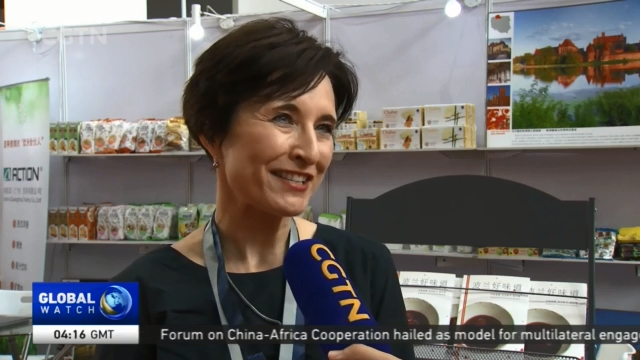
13:03, 08-Sep-2018
Food & Beverage Industry: Foreign exporters eyeing the Chinese market
Updated
12:12, 11-Sep-2018
03:16

500 foreign exhibitors from over 20 countries and regions have descended on the 2018 Hospitality World. It's billed as one of the most professional food and beverage exhibitions in Southern China. As Cui Hui'ao shows us, some there say the ongoing China-US trade friction has brought them big opportunities.
Since China imposed tariffs on American goods worth 50 billion US dollars, industry insiders say beef and pork products have bore the brunt of it all, especially in Guangdong Province.
QI YILONG, PRESIDENTGUANGDONG IMPORTED FOOD ASSOCIATION "Most US meat products enter China through Guangdong. So importing costs have gone up for many local importers. Whereas for snacks and fruits, tariff impacts are quite limited."
In 2017, around 14 percent of Guangdong's imported frozen pork meat came from the U.S. And in terms of pork parts, percentages were as high as 66 percent.
DU XU, GENERAL MANAGERGUANGDONG FOODSTUFFS IMPORT & EXPORT GROUP "With the 25 percent tariff, American pork does not have a price advantage anymore. Sourcing from other countries like France and the Netherlands is an option, but prices would be higher."
Experts say price is a big factor when it comes to trade. Despite the long-distance logistics, cheaper meat products from another part of the western world are now a viable option for Guangdong importers.
WAYNE SONG, SALES DIRECTORGUANGZHOU BNH IMPORT & EXPORT CO. "We are shifting our focus towards South America. Like right now we are importing beef from Uruguay because it has a reliable traceability system, plus its beef is one third cheaper than American beef."
The local imported food association says it's been sending delegations to South American countries to negotiate specifics, like freight cost and pricing.
President Xi Jinping says as soon as six months from now, they will be able to lock deals with alternative partners. Meanwhile, exporters from those countries are also looking to tap into the Chinese market.
JOANNA SKOCZEK CONSULCONSULATE GENERAL OF POLAND IN GUANGZHOU "Two years ago, we started to export Polish apples to China, and I hope the export will only be growing because polish apples are the best, they were very well received by Chinese consumers."
CARLOS JAVIER MARIN, CONSULCONSULATE GENERAL OF CHILE IN GUANGZHOU"Most Chilean producers are oriented to China. Besides cherries, we have apples, grapes, plums and we are already starting with walnuts, and maybe next year we will wait for the Chinese market to open for our lemons."
CUI HUI'AOGUANGZHOU "While the Chinese market is perhaps the most attractive for foreign food producers, many of them hope for simpler registration procedures on the Chinese side for faster, easier access."
Some exporters complain about the lengthy registration, certification and custom procedures.
JOANNA SKOCZEK CONSULCONSULATE GENERAL OF POLAND IN GUANGZHOU "So for example, the fact that you need to fulfill procedures that have already been fulfilled before. They should be simplified and encourage exporters to come to this market."
That said, when supply meets demand, plenty of deals will be made between China and these exporting countries.
They all agree on one consensus: trade without barriers would benefit everybody. Cui Hui'ao, CGTN, Guangzhou.

SITEMAP
Copyright © 2018 CGTN. Beijing ICP prepared NO.16065310-3
Copyright © 2018 CGTN. Beijing ICP prepared NO.16065310-3